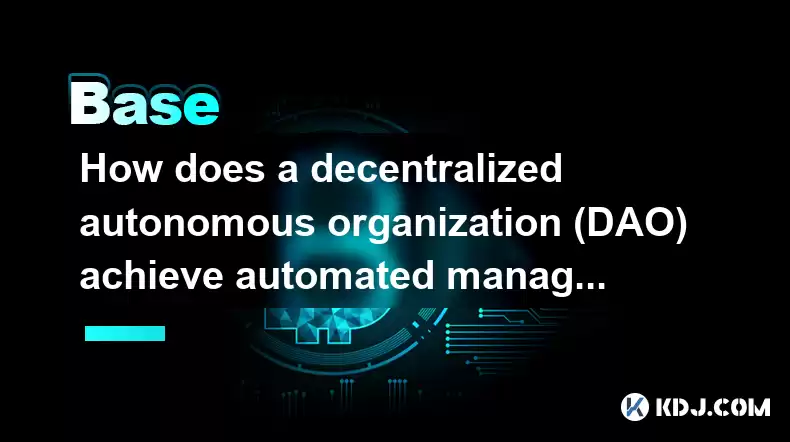-
 bitcoin
bitcoin $87959.907984 USD
1.34% -
 ethereum
ethereum $2920.497338 USD
3.04% -
 tether
tether $0.999775 USD
0.00% -
 xrp
xrp $2.237324 USD
8.12% -
 bnb
bnb $860.243768 USD
0.90% -
 solana
solana $138.089498 USD
5.43% -
 usd-coin
usd-coin $0.999807 USD
0.01% -
 tron
tron $0.272801 USD
-1.53% -
 dogecoin
dogecoin $0.150904 USD
2.96% -
 cardano
cardano $0.421635 USD
1.97% -
 hyperliquid
hyperliquid $32.152445 USD
2.23% -
 bitcoin-cash
bitcoin-cash $533.301069 USD
-1.94% -
 chainlink
chainlink $12.953417 USD
2.68% -
 unus-sed-leo
unus-sed-leo $9.535951 USD
0.73% -
 zcash
zcash $521.483386 USD
-2.87%
分散的自治组织(DAO)如何实现自动化管理?
Smart contracts automate DAO processes like treasury management and voting, while governance tokens enable member participation in decision-making, enhancing efficiency and transparency.
2025/04/02 08:15

Daos的自动化引擎:智能合约和治理令牌
分散的自治组织(DAOS)的目标是自动化管理,与传统的集中组织形成鲜明对比。这种自动化主要是通过智能合同和治理令牌的相互作用来实现的。智能合约,与直接写入代码的协议条款的自我执行合同构成了DAO操作的骨干。这些合同使各种流程自动化,从而消除了中介机构的需求。另一方面,治理令牌使代币持有人能够参与DAO内的决策过程。
智能合约部署在区块链上,以确保透明度和不变性。他们定义了DAO运营的规则和逻辑,例如财政部管理,提案创建和投票以及成员入职。当满足某些条件时,智能合约将自动执行指定的行动,而无需人工干预。这种自动化降低了运营成本并提高效率。
治理令牌在自动化管理过程中起着至关重要的作用。代币持有人(本质上是DAO成员)可以提出更改DAO的运营,提交资金的建议或对现有建议投票。通常在智能合同中定义的投票机制决定了这些建议的结果。法定人数是参加投票所需的令牌持有人的最低百分比,可确保足够的参与度。提案通过后,智能合约将自动执行必要的措施。
DAOS中自动化过程的具体示例
DAO管理的许多方面都是自动化的。让我们深入研究一些细节:
财政部管理:智能合约可以根据预定的规则或批准的提案自动分配资金。这消除了对手动批准的需求,并降低了人为错误的风险。成功完成项目或达到预定的里程碑后,将自动支付资金。
提案创建和投票:会员可以通过与智能合约交互的用户界面提交建议。然后,该合同会自动促进投票,计算投票和执行提案,如果该提案通过所需的门槛。这个简化的过程确保了决策的透明度和公平性。
成员入职和载板:智能合约可以根据预定义的标准(例如令牌所有权或满足特定要求)自动化添加或删除成员的过程。这消除了对手动批准的需求,并简化了会员管理。
赠款分配:道斯经常为项目或倡议提供资金。智能合约可以自动释放资金,一旦达到特定里程碑,可以通过链接或通过甲骨文来实现特定的里程碑。这样可以确保问责制和及时支付资金。
奖励分配:智能合约可以根据其贡献自动向贡献者分发奖励,并经过跟踪和验证。这激励参与并确保公平的赔偿。这种自动化系统促进了奖励贡献的效率和透明度。
Daos自动管理的局限性
尽管自动化具有很大的优势,但要承认其局限性至关重要。
智能合约的复杂性:制定和审核复杂的智能合约需要专业的专业知识和大量资源。代码中的错误或漏洞可能会导致意想不到的后果。
对Oracles的依赖:一些DAO依靠Oracles将外部数据馈送到智能合约中。 Oracles的可靠性和安全性对于DAO的功能至关重要。受损的甲壳可能导致信息不准确和决策有缺陷。
缺乏人类的监督:虽然自动化流程流程,但对自动化系统的完全依赖可能是有风险的。人类的监督仍然是解决不可预见的情况并做出需要细微判断的关键决定的必要条件。
治理挑战: DAO治理可能很复杂,尤其是在大型组织中。确保足够的参与并有效解决争端仍然是一个挑战。有效的治理机制对于防止冲突和维持DAO的完整性至关重要。
技术局限性:潜在的区块链技术的局限性会影响DAO内自动化过程的可扩展性和性能。高交易费用或缓慢的交易速度可能会阻碍有效的运营。
常见问题
问:DAOS自动化管理的好处是什么?答:DAOS中的自动化管理提供了提高效率,降低运营成本,提高透明度以及通过使用智能合约和不变的区块链技术提高了安全性。
问:治理令牌如何促进DAO自动化?答:治理令牌使令牌持有人能够参与决策过程,对提案提交和投票。然后,智能合约会根据投票结果自动执行决策。
问:Daos的自动化管理有哪些风险?答:风险包括智能合同脆弱性,对潜在不可靠的甲壳的依赖以及人类监督处理不可预见的情况和复杂治理问题的需求。
问:DAO的所有方面都可以自动化吗?答:虽然DAO管理的许多方面可以自动化,但有些需要人类的判断和干预。完整的自动化并不总是可行的或可取的。
问:DAO如何减轻与自动化管理相关的风险?答:严格的智能合同审核,使用良好的甲壳,建立健壮的治理机制以及纳入人类的监督对于缓解风险至关重要。
免责声明:info@kdj.com
所提供的信息并非交易建议。根据本文提供的信息进行的任何投资,kdj.com不承担任何责任。加密货币具有高波动性,强烈建议您深入研究后,谨慎投资!
如您认为本网站上使用的内容侵犯了您的版权,请立即联系我们(info@kdj.com),我们将及时删除。
- 比特币核心辞职引发了对爱泼斯坦资助关系的猜测,但事实却讲述了不同的故事
- 2026-02-06 06:30:01
- 柴犬币价格预测:引导炒作与现实
- 2026-02-06 07:20:02
- 爱泼斯坦的幽灵,中本聪的影子:比特币被劫持的叙事占据中心舞台
- 2026-02-06 07:05:01
- 山寨币季节升温:APEMARS 预售成为加密货币热潮中的关键参与者
- 2026-02-06 07:15:01
- 比特币的董事会突破:重塑 B2B 支付和企业资产负债表
- 2026-02-06 07:15:01
- 比特币的波动对 MSTR 造成沉重打击:Michael Saylor 面临巨额未实现损失
- 2026-02-06 07:10:02
相关百科

加密货币和区块链技术的未来是什么?
2026-01-11 21:19:34
去中心化金融的演变1. DeFi 协议已经从简单的借贷扩展到包括结构性产品、保险机制和衍生品交易。 2. 智能合约审计变得更加严格,多公司验证流程现已成为主要协议发布的标准。 3. 跨链互操作解决方案现在支持 40 多个不同的区块链网络,无需中心化桥梁即可实现资产转移。 4. 收益聚合策略已经发展到...

中本聪是谁? (Bitcoin 的创造者)
2026-01-12 07:00:05
笔名的由来1. Satoshi Nakamoto 是开发 Bitcoin、撰写其原始白皮书并设计和部署其第一个实现的个人或团体使用的名称。 2. 该名称首次出现于 2008 年,当时一份名为“Bitcoin:点对点电子现金系统”的白皮书被发布到密码学邮件列表中。 3. 尚未确认可验证的身份,所有已知...

什么是加密货币空投以及如何获得?
2026-01-22 14:39:35
了解加密货币空投1. 加密空投是向多个钱包地址分配免费代币或代币,通常由区块链项目发起,以提高知名度、奖励早期支持者或分散代币所有权。 2. 这些分配可能不需要任何前期成本,尽管有些分配需要最低限度的参与,例如持有特定的加密货币、关注社交媒体帐户或加入社区渠道。 3. 空投通常与协议升级、主网启动或...

什么是 DeFi 中的无常损失以及如何避免它?
2026-01-13 11:59:34
了解无常损失1. 当存入自动做市商(AMM)流动性池的代币价值与外部持有的代币价值出现偏差时,就会发生无常损失。 2. 出现这种现象的原因是大多数AMM采用恒定乘积公式,池内代币价格的比例必须与外部市场价格保持一致。 3. 当一对资产中的一种资产相对于另一种资产大幅升值时,套利者通过购买较便宜的资产...

如何桥接不同区块链之间的加密资产?
2026-01-14 18:19:42
跨链桥机制1. 原子交换实现了两个区块链之间直接的点对点资产交换,无需中介,依靠哈希时间锁定合约来保证公平性和最终性。 2. 可信桥通过中心化或半中心化托管人进行操作,这些托管人持有用户存款并在目标链上铸造包装代币。 3. 去信任桥使用智能合约和加密证明(例如轻客户端或零知识验证)来验证状态转换,而...

什么是白皮书以及如何阅读白皮书?
2026-01-12 07:19:48
了解白皮书结构1. 加密货币领域的白皮书充当基础技术和概念文件,概述了区块链项目的目的、架构和机制。 2. 通常以摘要或执行摘要开始,介绍项目旨在解决的问题和建议的解决方案。 3. 引言部分定义了核心术语,在现有技术或经济限制范围内建立了背景,并引用了先前的工作或类似系统。 4. 技术规范如下,详细...

加密货币和区块链技术的未来是什么?
2026-01-11 21:19:34
去中心化金融的演变1. DeFi 协议已经从简单的借贷扩展到包括结构性产品、保险机制和衍生品交易。 2. 智能合约审计变得更加严格,多公司验证流程现已成为主要协议发布的标准。 3. 跨链互操作解决方案现在支持 40 多个不同的区块链网络,无需中心化桥梁即可实现资产转移。 4. 收益聚合策略已经发展到...

中本聪是谁? (Bitcoin 的创造者)
2026-01-12 07:00:05
笔名的由来1. Satoshi Nakamoto 是开发 Bitcoin、撰写其原始白皮书并设计和部署其第一个实现的个人或团体使用的名称。 2. 该名称首次出现于 2008 年,当时一份名为“Bitcoin:点对点电子现金系统”的白皮书被发布到密码学邮件列表中。 3. 尚未确认可验证的身份,所有已知...

什么是加密货币空投以及如何获得?
2026-01-22 14:39:35
了解加密货币空投1. 加密空投是向多个钱包地址分配免费代币或代币,通常由区块链项目发起,以提高知名度、奖励早期支持者或分散代币所有权。 2. 这些分配可能不需要任何前期成本,尽管有些分配需要最低限度的参与,例如持有特定的加密货币、关注社交媒体帐户或加入社区渠道。 3. 空投通常与协议升级、主网启动或...

什么是 DeFi 中的无常损失以及如何避免它?
2026-01-13 11:59:34
了解无常损失1. 当存入自动做市商(AMM)流动性池的代币价值与外部持有的代币价值出现偏差时,就会发生无常损失。 2. 出现这种现象的原因是大多数AMM采用恒定乘积公式,池内代币价格的比例必须与外部市场价格保持一致。 3. 当一对资产中的一种资产相对于另一种资产大幅升值时,套利者通过购买较便宜的资产...

如何桥接不同区块链之间的加密资产?
2026-01-14 18:19:42
跨链桥机制1. 原子交换实现了两个区块链之间直接的点对点资产交换,无需中介,依靠哈希时间锁定合约来保证公平性和最终性。 2. 可信桥通过中心化或半中心化托管人进行操作,这些托管人持有用户存款并在目标链上铸造包装代币。 3. 去信任桥使用智能合约和加密证明(例如轻客户端或零知识验证)来验证状态转换,而...

什么是白皮书以及如何阅读白皮书?
2026-01-12 07:19:48
了解白皮书结构1. 加密货币领域的白皮书充当基础技术和概念文件,概述了区块链项目的目的、架构和机制。 2. 通常以摘要或执行摘要开始,介绍项目旨在解决的问题和建议的解决方案。 3. 引言部分定义了核心术语,在现有技术或经济限制范围内建立了背景,并引用了先前的工作或类似系统。 4. 技术规范如下,详细...
查看所有文章










































































